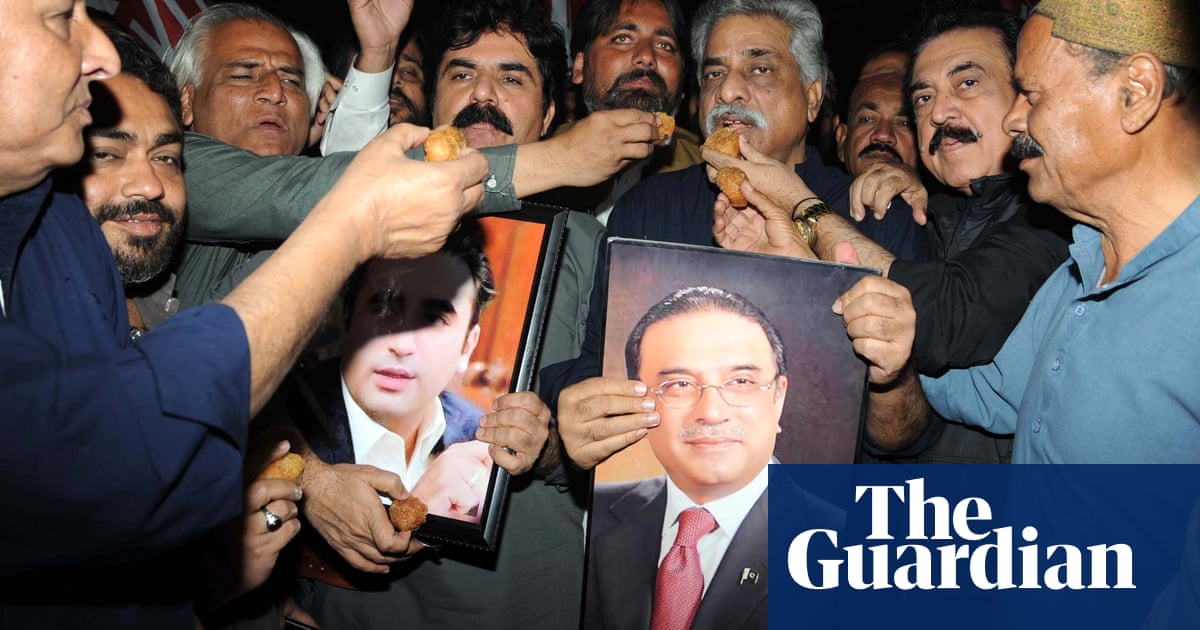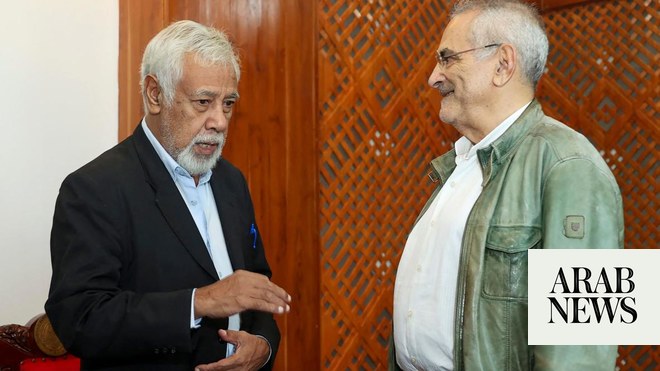
Last month, as the slogans and cries of “Ek Zardari sab pe bhari” (One Zardari, outweighs all) rang out across the presidential palace, Asif Ali Zardari – with his signature grin – took his oath to become Pakistan’s president for the second time.
Few figures have been such a constant, and often controversial, presence in Pakistani politics over the years as Zardari, a man who has spent more years in a jail cell than in political office.
He was first thrust into the limelight in late 1988, when his wife, Benazir Bhutto, became Pakistan’s first female prime minister. The Bhuttos were a prominent political family; her father, Zulfikar Ali Bhutto, had been prime minister in the 1970s but was then toppled and executed by the military. In 2007, Benazir Bhutto was shot dead while out campaigning; her killers have never been caught.
Zardari, now 68, was a businessman but he took an active role in Bhutto’s government. It was during her first tenure that allegations began to circulate that he was using her office for corrupt deals and government contracts. When her government fell in 1990, much of the blame fell on Zardari. Two years later he was jailed on corruption charges and became widely referred to as “Mr 10%” for the kickbacks he allegedly demanded – a moniker that has stuck to him to this day.
When Bhutto returned to power in 1993, Zardari was appointed as a cabinet minister and his role was increased. Nusrat Javeed, a political analyst said “During the second government of Bhutto, Zardari’s influence on party and government affairs had increased.”
When Bhutto’s government fell again in 1996, Zardari was arrested and charged not only with corruption – including amassing $100m (£78m) in bank deposits and luxury property abroad – but with orchestrating the assassination of his brother-in-law Mir Murtaza Bhutto, who had been one of Zardari’s most vocal critics.
In her book Songs of Blood and Sword: A daughter’s memoir, the author Fatima Bhutto recalled her father Murtaza’s last words after he was shot in an alleged encounter by police were: “They got us. Zardari … finally got us.”
Zardari denied all allegations and was never found guilty of murder. In 2002, he was convicted for receiving kickbacks during his wife’s tenure, and a year later, he and Bhutto were both convicted by a Geneva court of laundering $13m. However, both cases were later overturned on appeal.
As Gen Pervez Musharraf was in power after a coup, Zardari spent the next eight years in jail, facing torture while inside and wasn’t released until 2004.
Three years later, he found himself once again catapulted into the political limelight after his wife’s assassination as she addressed a rally in Rawalpindi. Zardari took over as chair of her Pakistan People’s party and led the PPP to a resounding victory on the back of a wave of sympathy after her death, although he never achieved her level of popularity among the public.
“Zardari was not someone to travel across the country to address voters. He was not charismatic or a public figure. He is a shrewd politician, a man who is known for wheeling and dealing,” said Zahid Hussain, an author and analyst.
It was after the 2008 election victory that Zardari was appointed president for the first time, a largely ceremonial but still influential role. Yet it did not take long for the corruption allegations to emerge once again after the Swiss authorities dropped a money-laundering case against him at the request of the Pakistan government. He denied any wrongdoing.
Zardari was the first president in Pakistan to serve a full five-year term in office, but the PPP suffered a crushing defeat in the 2013 elections, a time when the country’s economy was in shambles.
In the aftermath, Zardari retreated back to Karachi in Sindh, the heartland of the PPP, which still controlled the state government. Many have alleged that under Zardari’s PPP government, corruption became so deeply entrenched in Sindh that nothing took place without money passing through the pockets of his administration, to the longstanding detriment of development and law and order.
One powerful businessman, who asked to remain anonymous, alleged: “Be it revenue, developmental projects, contracts, building authorities or any departments, they take kickbacks or bribes, or money; they call it a system. As it is supported by the top leadership, so everyone takes the share. At least 10% goes to the top, and people in the middle and lower levels take their share, so it goes beyond 20% these days.”
Sharjeel Inam Memon, a senior Sindh minister, described the allegations against Zardari and the PPP as “political propaganda and lies”. He said: “We don’t take any percentage on any project and no department is involved taking any percentage. It is all baseless allegations.”
While Bhutto made a name for herself standing up to Pakistan’s powerful military establishment, who has been accused of being behind her assassination, Zardari has steered clear of that fight and has largely seen to cooperate with the powerful generals who are the country’s political kingmakers.
“In party meetings, Zardari clearly states that we should not fight the military’s role and we can’t afford to,” said one PPP politician, who did not want to be named.
Though he has claimed to be handing over some of the political reins to his son, Bilawal Bhutto Zardari, with whom he now co-chairs the PPP and who previously served as foreign minister, Zardari is still seen to ultimately hold the power.
Hussain added: “Bilawal always remained under the shadow of his father, who is known to call the shots. It is Zardari who takes the decisive political decisions.”
After February’s controversial general election, which was marred by allegations of widespread vote rigging, Bilawal Bhutto Zardari took a backseat while his father was seen to get his way when the PPP decided to join the coalition government alongside Pakistan Muslim League Nawaz – ensuring that the former prime minister Imran Khan’s Pakistan Tehreek-e-Insaf party could not take power, despite receiving the most votes.
Acting as a crucial kingmaker in giving the coalition the numbers it needed for a majority, Zardari then successfully negotiated himself one of the top posts, becoming the first person to serve as Pakistan’s president twice.
“To some people he is a villain,” said Javeed. “And to some he is a hero.”












